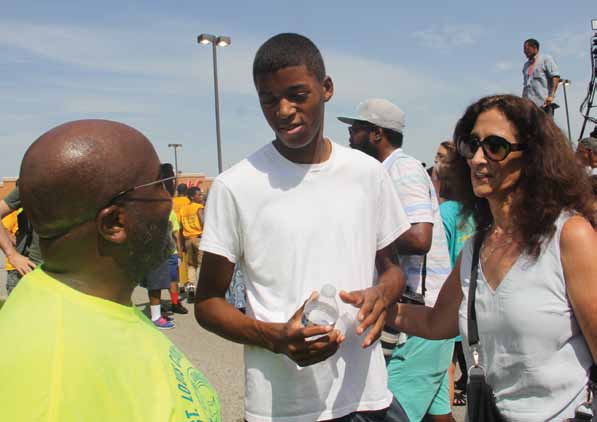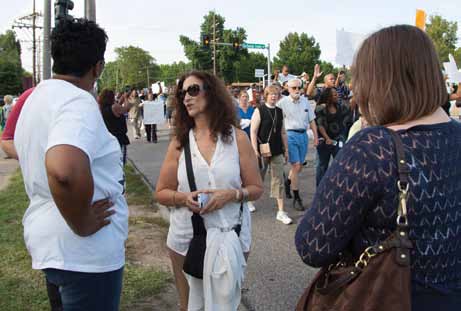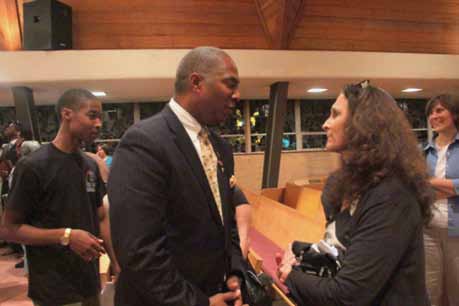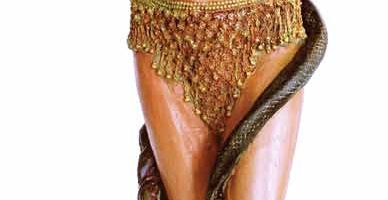
Find Your Fergusons

Rabbi Susan Talve with her student Terrell Wooten Jr. at a youth march in Ferguson.
I’ve been here in St. Louis for 34 years. The violence that we are seeing has been waiting to erupt for much longer. The congregation that I helped to found 30 years ago was created to be a presence in the urban core, where the ravages of racism and economic disparity are visible through the windows of our sanctuary.
But Ferguson, Missouri, is not the inner city. It is a pleasant, middle-class suburb, with shopping centers and Starbucks. Many families moved to Ferguson to give their children a better environment. But the profiling by the primarily white police of the majority African-American population was bound to cause problems. Any parent of a black male will tell you about the “talk” you have with a boy child. “Keep your head down. Be polite. Don’t run from the police. Lose the attitude.”
In St. Louis, the racism and the violence that we are seeing have been waiting to erupt for decades. Tax bases, property values and self-interest have created the institutional structures of oppression that have added to the economic and racial segregation of our neighborhoods.
This disparity of class has caused us to have two Americas, because it divides us and keeps us from having personal connections across the divide.
The second highest source of revenue in Ferguson is from traffic tickets. Spend some time in night court. You’ll see that the defendants are almost all black. It is no wonder that our prisons are full of people who are poor and black. Prison is big business here, as it is everywhere.
In Ferguson this August, Michael Brown, an unarmed, 18-year-old African American teen, was killed by police. Several weeks of protests followed and then, the night before his funeral, many of us who had been on the front line of the protests against racist policing stopped marching and chanting. Instead, we stood on the steps of the Old Court House in St. Louis and prayed quietly for Brown’s family, and for the families of so many black men who have been shot by police.
Michael Brown’s death, and his mother’s grief, touched the nerve that shot across the racial, geographic and economic fractures of our region.
At one of the first community services after the shooting — with Jewish, Christian and Muslim clergy present — I was asked to give a prayer for the Brown family. I offered up the story of Nachshon at the Red Sea. Weary of listening to Moses pray for God’s assistance, Nachshon jumped into the sea to part the waters that would open the road to freedom and bring the promise of a new paradigm of freedom and equality. I added to the narrative that what really parted the waters was all the people jumping in to save Nachshon. Not just his parents and those who knew him, but all of the people risking their lives for that one child.

With Reverend Traci Blackmon, a UCC minister at a protest on August 14
On Shabbat afternoon during the protests, I marched in Ferguson to lift up the voice of the wonderful young people who have emerged to keep the peace on the streets. I marched with a tall, black 16-year-old who lives in Ferguson and celebrated his bar mitzvah and confirmation at our St. Louis synagogue, Central Reform Congregation.
As we were marching together, I heard a shout-out from the side of the road. It was a white, ex-Marine St. Louis City police officer who had come to help keep the peace too. “Rabbi Talve! Don’t you remember me? You did my bar mitzvah!”
So there I was, marching between two young men who shared common ground in Torah, one a kid of color from Ferguson who just wants to get back to school, the other a police officer whose job it is to keep him safe. These relationships are what blur the lines of separation and can eventually help us to change the culture of prejudice and its consequences.

At Christ the King Church, a primarily black church where Talve was asked to speak.
Every week, the Torah portions have been guiding us. The Shabbat of the shooting, V’etchanan, we read about Moses pleading to enter the land of Israel. Just as Moses readied us to turn the leadership over to Joshua and the next generation, we Jews supported the black youth who shaped the protest.
The next week we studied the portion “Ekev” and were warned that when we enter the land we will depend too much on her plenty. We will forget that the way to peace is through gratitude and service to others.
The text worried that the wheat, the barley, the pomegranate, figs, olive oil, and date honey will spoil us — but the answer is not to deny us these wonderful delights. The answer is to bless them, because without the blessing, without remembering they all come from a Unity of which we are a part — but only a part, there is no chance for the ultimate “savata,” the ultimate filling up inside so that we are ready to overflow love and kindness and compassion whenever we possibly can. We learn we can be satisfied without being complacent.
Everything one does matters, even the little things that fall under your heel that you don’t think are important. Showing up to be one more body to march, to bring food, to read to the children in the library, to mentor.
Our congregation vowed on that Shabbat that we would go to Ferguson, to frequent the businesses that have been struggling to survive through the riots. One of our members who is in a wheel chair said that while she couldn’t march, she could go and eat each lunch at a restaurant struggling to stay open. Another woman found a hair salon in Ferguson to get her hair cut, and was the only customer that day. These acts matter and may tip the scales. The teachings of Torah pushed us out of the synagogue and out of our comfort zones, to pray with our legs.
And as we pray for a just trial in Ferguson, of course the portion is Shoftim, the call to appoint judges who will deal fairly with all people. We meet the words “Tzedek, tzedek tirdof — Justice, justice you shall pursue.” Reminding us that there must not be two Fergusons, or two Americas, any longer.
This is personal for the Jewish community because these are our children, this is our community and to be a Jew is to be part of the solution, not part of the problem. Jews know what it is to be marginalized. Our work is to move the margins to the center.
Our congregation has been able to bridge many worlds during this crisis because we have been showing up at the site of these violent shootings for many years. We have worked to end the violence of the poverty cycle by being in the center of the struggles to make health care accessible to all, pass more restrictive gun legislation, create equity in education and reform immigration policies. We are leaders in the Fair Food Movement that demands an end to the modern day slavery of farm workers, fast food workers and others who work full time and still do not make a living wage that can support them and lift them out of poverty.
We will use what we have to be part of the solution. We will use the energy unleashed to fuel the legislation needed to stop the profiling, to re-train police, to control the guns and welcome the immigrants, to raise the minimum wage and provide jobs and job training and do all the things we know we need to do to heal the divide.
And we here in St. Louis challenge all of America to find your Ferguson, find that sleepy suburb that is ready to erupt, and jump in together to save all our children.
Here are just a few of many actions we Jews can take:
1. Support national legislation to curb profiling by police, which only alienates and angers the very people who can help identify troublemakers.
2. Support national requirements for police training and accountability.
3. Support campaigns for a living wage for all workers. The young black men and women I know who are helping and organizing these include the wonderful friends I have marched with from fast food chain to fast food chain. Those with influence should use our influence to make room for them at the power tables.
4. Explode the myth that all Jews are white people living in the suburbs. Our congregation has many black members with black sons scared for their lives. One of my bar mitzvah and confirmation students is black and lives in Ferguson. He is scared to leave his apartment. This is personal. It is about us.
5. Please tell every community across America to wake up. Find your own Ferguson. In ours, the majority grew to be largely black and middle class, while the government and the police force stayed white.
6. Register everyone to vote. Oppose the legislation that limits access to voting for the poor. Support early voting.
7. Think about helpful alliances — small and large — that you can draw together. In early September, all denominations of the Jewish community pitched in to provide the food and fun (face painting, a small camel) for a street festival in Ferguson. And after another trip to the state capital to fight for Medicaid expansion, I attended a meeting with the head of the national AFL-CIO to ask them for specific ways to help make Ferguson an employment model for the country.
In St. Louis we are also gathering a coalition that includes the Jewish community and the business leaders in the area to create a community resource center for jobs, after we first do an assessment with the people who will be served, in order to hear what they feel they need. This is an obvious but important piece for this kind of organizing and activism. Businesses are offering jobs here, but people also need a place to get help with GEDs and job training before many will be ready for those jobs.
We challenge everyone across America to “Find Your Ferguson,” before your community finds itself with more lost lives.
In this New Year, the Jewish community must be right there on the front lines, doing everything we can to make sure that all of our children are written into the Sefer Chayim, the Book of Life, for another year.
Rabbi Susan Talve is the founding rabbi of Central Reform Congregation, the only Jewish congregation located within the city limits of St. Louis. When other congregations were leaving the city for the suburbs, Rabbi Talve joined with a small group to keep a vibrant presence in the city to be on the front line of fighting the racism and poverty plaguing the urban center. Thanks to the St. Louis Jewish Light, the Shalom Center and T’ruah: The Rabbinic Call for Human Rights.


